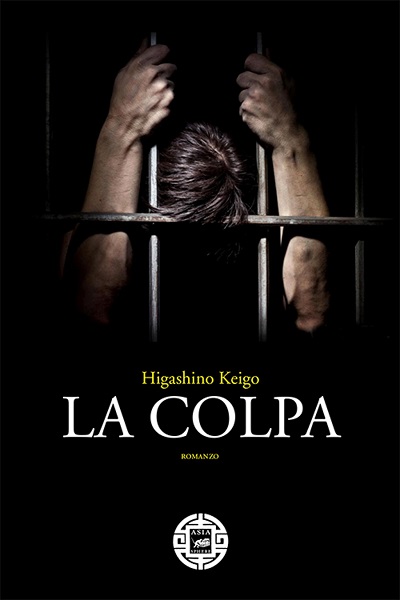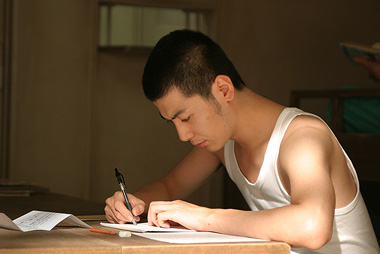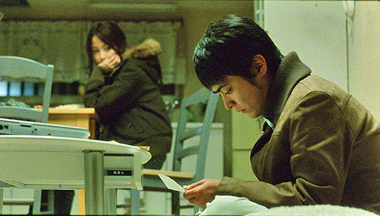
#NipPop meets Anna Specchio
- Details
- Written by NipPop Staff

NipPop meets Anna Specchio, a young contemporary Japanese literature researcher and translator. Among her latest, she translated for Asiasphere (Atmosphere Editore) Higashino Keigo's best seller The Letter.
NipPop: Higashino Keigo is one of Japan's best known contemporary authors. How did you approach him? What are his writing's strong points?
Anna Specchio: I first met Hiashino Keigo at a dinner: not in person, of course, but his name came up during a conversation and, having never read anything by him, the day after I immediately went and bought some of his works (some I had to find second hand, in their Italian translation). It didn't take long before I became a fan, as I am a bit reader of thrillers and mystery. At that time I was translating Hori Tatsuo's The Wind Rises, and I never thought I would get the chance to translate a Higashino novel so soon! It was Gianluca Coci, my doctoral supervisor, who suggested I should translate Tegami: he called me up one day, and asked me whether I felt like embarking on this adventure. How could I say no? I was 28 and the idea of translating Higashino Keigo excited me! :-)
As far as his writing goes, I think the main strong point is the style, and the originality of his plots. His writing style is simple, yet elegant. His voice is that of a man who lives in contemporary Japan, he can sense society and its changes, and he mixes that with suspenseful plots. When I first read Suspect X I was stunned: the pain the protagonist goes through can't be expressed through words. The behavior of the characters in The Secret of the Lake is chilling, just like those we read about in The Letter. I think Higashino really captures what lays at the bottom of the human condition.

NipPop: The Letter is a novel in which Higashino touches on some of his favorite themes – family relationships, social pressure: where do you think his originality lays?
Anna Specchio: he's not too direct in his criticism: his accusations against society are often disguised behind his characters' actions, there is no omniscient narrator who chastises this or that behavior. There are opinions, of course, but they are subjective and presented as such. Naoki and her tutor, for example, fear that the young man cannot find a job because of the lack of support from a traditional family, but in the text there is no specific accusation moved against Japanese society. It's just a supposition, though a justified one.

NipPop: can you tell us something about your experience translating this novel? What captured you, and what was difficult about it?
Anna Specchio: what really struck me is the simplicity of his writing style. Each phrase is direct and simple, which actually makes it quite difficult to translate them into Italian. A few chronological conundrums or complex sentences aside, I didn't encounter huge difficulties. It took a lot of editing though: Japanese prefers passive forms, while Italian privileges active verbs; often a few characters need multiple Italian sentences to be expressed properly. So yes, the Italian aspect gave me the biggest headaches! It was good training: I translated with a passion, and I moved quickly from a so-so first draft to a satisfying final copy. At least I hope so ;)

NipPop: a little trivia: how was the title, La Colpa (The Guilt), chosen? As the original title is Tegami (Letters)?
Anna Specchio: When the editor asked me to choose a title for the Italian edition, I first thought of keeping the title and calling it The Letters. But it would be hard for such a vague title to grab readers. I also thought of Letters from Prison, but that would recall to mind Gramsci, and that would be a very silly association. We could have also titled it The Last Letter, as the last letter that ends the relationship between the two brothers, but I was afraid it would reveal too much. The publisher then suggested Criminal, which pointed to the characters, as well as the many prejudices to be found in Japanese society. But that title would make the reader think of a noir, which Tegami isn't. So, in the end, I suggested La Colpa, which is a very strong theme throughout the book: Tsuyoshi's guilt, Naoki's inherited guilt, and society's guilt toward the two brothers.
NipPop: in your mind, at the end of the story, the act of singing Lennon's Imagine does actually rejoin the two brothers?
Anna Specchio: absolutely yes. This, assuming Naoki actually managed to sing it! On topic, I strongly suggest the 2006 movie based on the novel, produced by Shōno Jirō. While Imagine is the book's theme song, in the movie Naoki doesn't sing it even once, as in that adaptation he tries to become a comedian instead of a musician (a very poor choice). So, in front of the inmates, the film's Naoki performs some cabaret routine, and he succeeds. We see Tsuyoshi heading back to his cell with the other inmates, and Naoki leaving the prison and meeting Yumiko and Miki. Each brother returns to his own reality. That scene's background music is Kotoba ni dekinai by Oda Kazumasa: Anata ni aete, hontō ni yokatta, ureshikute, ureshikute, kotoba ni dekinai. La la la…


